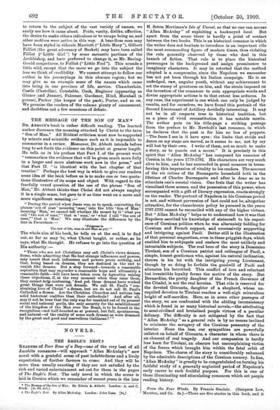NOVELS.
nth EAGLE'S NEST.t
READERS of Poor Sons of a Day—one of the very best of all Jacobite romances—will approach "Allan Malulay's " new novel with a grateful sense of past indebtedness and a lively expectation of further favours to come. And they will be more than usually exacting if they are not satisfied by the rich and varied entertainment set out for them in the pages of The Eagle's Nest. The only novel in which the scene is laid in Corsica which we remember of recent years is the late The Message of the Son of Man. By Edwin I. Abbott. London: A. and C. Black. [is. 6d. net.] t The Eagle's Nest. By Allan McAulay. London: John Lane. [6e.3 H. Seton Merriman's Isle of Unrest, so that no one can accuse " Allan McAuley" of exploiting a hackneyed local. But apart from the scene there is hardly a point of contact between the two books. This is an historical romance in which the writer does not hesitate to introduce in an important role the most commanding figure of modern times, thus violating the rule generally observed by those who deal in this branch of fiction. That rule is to place the historical personages in the background and assign prominence to imaginary characters. It may be retorted that the method adopted is a compromise, since the Napoleon we encounter has not yet been through his Italian campaign. He is an unfledged, raw, angular youth, without any achievement to set the stamp of greatness on him, and the strain imposed on the invention of the romancer to coin appropriate words and devise appropriate actions is to that extent less arduous. In any case, the experiment is one which can only be judged by results, and for ourselves, we have found this portrait of the Second Lieutenant of Artillery decidedly interesting. It may not be in all respects true to historical tradition, but as a piece of vivid reconstitution it has notable merits. The author puts on his title-page a striking passage from the preface to Mr. Newbolt's last romance, in which he declares that the past is for him no box of puppets. "The faces I see in it have eyes : the limbs that stride and dance on my stage are moved, as it seems to me, not by my will but by their own. I write of them, not so much to make a story, as to puzzle out a secret." It is precisely in this spirit that "Allan McAuley" has composed his romance of Corsica in the years 1779-1792. His characters are very much alive to him, and he has succeeded in great measure in trans- ferring this impression of vitality to his readers. The account of the vie in time of the Buonaparte household both in the lifetime of Charles Buonaparte and after is done so as to stimulate one's mental vision. One feels that the writer has visualised these scenes, and the possession of this power, when accompanied with a gift of literary expression, reacts strongly on the reader. The portrait of Napoleon in his Corsican period is not, and without perversion of fact could not be, altogether attractive, for the chameleonic policy he pursued in the years 1787-1792 cannot be reconciled with any of the higher virtues. But "Allan McAuley" helps us to understand how it was that Napoleon ascribed his knowledge of statecraft to his experi- ence of Corsican politics when he was alternately bidding for Corsican and French support, and successively supporting and intriguing against Paoli. Better still is the illustration of that personal magnetism, even in these priggish days, which enabled him to subjugate and enslave the most unlikely and intractable subjects. The real hero of the story is Domenico Tirolani, son of a Corsican patriot and colleague of Paoli, a simple, honest gentleman who, against his natural inclination, throws in his lot with the intriguing young Lieutenant, though by so doing he forfeits the goodwill of Paoli and alienates his betrothed. This conflict of love and reluctant but irresistible loyalty forms the motive of the story. But Bernardine, the pretty daughter of the French Governor of the Citadel, is not the real heroine. That role is reserved for the devoted Giocanta, daughter of a shepherd, whose un- requited devotion to Tirolani reaches a well-nigh miraculous height of self-sacrifice. Here, as in some other passages of the story, we are confronted with the abiding inconsistency which is found in so many historical novels,—the attributing to semi-civilised and brutalised people virtues of a peculiar delicacy. The difficulty is not mitigated by the fact that "Allan McAuley" as a general rule is by no means inclined to minimise the savagery of the Corsican peasantry of the interior. None the less, our sympathies are powerfully enlisted on behalf of Giocanta, a character in whom there is an element of real tragedy. And our compassion is hardly less keen for Tirolani, an obscure but uncomplaining victim of the forces which brought him within the fatal orbit of Napoleon. The charm of the story is considerably enhanced by the admirable descriptions of the Corsican scenery. In fine, "Allan McAuley" is greatly to be congratulated on turning his faithful study of a generally neglected period of Napoleon's early career to such fruitful purpose. For this is one of those illuminating and stimulating romances which set people reading history.










































 Previous page
Previous page